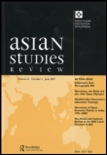
Asian Studies Review
Scope & Guideline
Unveiling the Complex Narratives of the Asian Experience
Introduction
Aims and Scopes
- Interdisciplinary Research:
The journal emphasizes interdisciplinary approaches, integrating perspectives from history, sociology, political science, cultural studies, and linguistics to examine complex Asian societies. - Cultural and Historical Analysis:
A significant focus is placed on cultural and historical studies, exploring how past events shape current societal norms and identities across Asia. - Social and Political Dynamics:
Research that investigates the socio-political landscape of Asian countries, including governance, activism, and international relations, is a core area of the journal. - Gender and Sexuality Studies:
The journal increasingly addresses issues related to gender and sexuality, highlighting how these aspects intersect with cultural and political identities in various Asian contexts. - Migration and Diaspora Studies:
Exploring the themes of migration, diaspora, and transnationalism, the journal examines how these phenomena influence cultural exchanges and identity formations. - Environmental and Economic Issues:
The journal also engages with environmental studies and economic issues, analyzing how they impact social structures and cultural practices in Asia.
Trending and Emerging
- Digital Culture and Media Studies:
An increasing number of publications focus on the impact of digital culture and media on social movements, identities, and cultural expressions, showcasing the role of technology in shaping modern Asian societies. - Activism and Grassroots Movements:
Research on activism, particularly grassroots movements in various Asian contexts, is on the rise, reflecting a heightened interest in social change and civic engagement. - Intersectionality in Gender Studies:
There is a notable trend towards intersectional approaches in gender studies, exploring how gender interacts with race, class, and sexuality in diverse Asian contexts. - Environmental Justice and Sustainability:
Emerging themes in environmental justice and sustainability highlight the interplay between ecological issues and social equity, focusing on grassroots responses to climate change and environmental degradation. - Transnationalism and Globalization:
The journal increasingly addresses themes of transnationalism and globalization, examining how these forces affect identity, culture, and politics across borders. - Cultural Hybridity and Diaspora Narratives:
Research focusing on cultural hybridity and diaspora narratives is gaining momentum, reflecting the complexities of identity in an increasingly interconnected world.
Declining or Waning
- Traditional Historical Narratives:
There has been a waning interest in conventional historical narratives that do not incorporate contemporary relevance or interdisciplinary perspectives, as scholars increasingly seek to connect historical events with modern issues. - Monolithic National Studies:
Research focusing solely on the national narratives of individual Asian countries has diminished, giving way to more comparative and transnational studies that reflect the interconnectedness of Asian societies. - Static Cultural Representations:
Themes that depict static cultural representations without acknowledging the dynamic nature of cultural practices and identities are appearing less frequently, as scholars call for more nuanced analyses. - Simplistic Colonial Studies:
The simplistic dichotomies in colonial studies, which often ignore local agency and complexity, are being replaced by more comprehensive approaches that consider varied perspectives and experiences. - Conventional Economic Analyses:
Traditional economic analyses that lack a socio-cultural context are declining, with a growing preference for studies that integrate economic factors with social implications.
Similar Journals
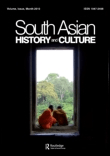
South Asian History and Culture
Advancing Insights into South Asian Heritage and IdentitySouth Asian History and Culture, published by Routledge Journals, Taylor & Francis Ltd, is an essential academic platform aimed at advancing the understanding of the historical and cultural dimensions of South Asia. With an ISSN of 1947-2498 and an E-ISSN of 1947-2501, this journal has established itself as a key resource for researchers and professionals in the fields of Arts and Humanities, Cultural Studies, Sociology, and Political Science. The journal occupies a significant standing in academia, reflected by its categorization in Q2 across multiple disciplines, highlighting its impact and relevance. Its Scopus rankings further emphasize its influence, ranking 31/173 in General Arts and Humanities and maintaining an 82nd percentile. Additionally, South Asian History and Culture provides a unique forum for scholarly discourse, ensuring the latest research is accessible to a global audience, thereby enriching the academic community's understanding of South Asian dynamics. By delving into themes ranging from social structures to cultural identities, the journal invites contributions that can drive forward innovative discussions and establish new paradigms in South Asian studies.
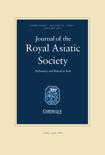
JOURNAL OF THE ROYAL ASIATIC SOCIETY
Bridging Cultures Through Scholarly ExplorationJournal of the Royal Asiatic Society, published by Cambridge University Press, stands as a pivotal resource in the fields of Arts and Humanities, particularly in Cultural Studies. With an impressive Q1 ranking in Cultural Studies and a Q2 ranking in Arts and Humanities (miscellaneous), it serves a diverse readership, including researchers, professionals, and students keen on exploring the rich tapestry of Asian cultures and their global interactions. The journal covers a wide spectrum of topics from historical perspectives to contemporary cultural phenomena, making it essential for those interested in the complexities of Asian societies. Though it does not offer open access, the journal's thought-provoking articles are invaluable, backed by rigorous academic standards and a robust editorial team. Operating from the heart of the United Kingdom, it has established a commendable Scopus ranking, asserting its influence with a 67th percentile in general Arts and Humanities and a 62nd percentile in Social Sciences. The journal has been diligently publishing scholarly work since 1991 and continues to shape the discourse in Asian studies, fostering an environment where knowledge thrives and evolves unto 2024 and beyond.

MODERN ASIAN STUDIES
Advancing Knowledge on Asia's Complex HistoriesModern Asian Studies, published by Cambridge University Press, is a highly esteemed journal that encompasses scholarly research focused on the vibrant and complex narratives of Asian societies, cultures, and histories. With an ISSN of 0026-749X and an E-ISSN of 1469-8099, this journal has been at the forefront of Asian studies since its inception in 1967 and continues to evolve, striving towards excellence with a convergence period extending to 2024. It holds a prestigious Q1 ranking in History and Q2 rankings in both Geography, Planning, and Development as well as Sociology and Political Science as of 2023. With Scopus rankings placing it in the top 92nd percentile in History and maintaining significant standing in other social sciences categories, Modern Asian Studies provides invaluable insights for researchers, professionals, and students alike. Although not an open-access journal, it remains committed to disseminating impactful research that addresses critical issues within Asian studies, enhancing the academic discourse and contributing to a deeper understanding of the region's past and present.
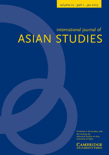
International Journal of Asian Studies
Fostering Insightful Discourse on AsiaThe International Journal of Asian Studies, published by Cambridge University Press, stands as a pivotal platform for scholars exploring the complexities and dynamics of Asian societies. With an ISSN of 1479-5914 and an E-ISSN of 1479-5922, this journal began its journey in 1996 and has actively contributed to the field through a range of multidisciplinary research articles, fostering engagement in both the Arts and Humanities and Social Sciences. Holding a respectable Q2 category in Arts and Humanities and a Q3 category in Social Sciences for the year 2023, it is recognized for its critical insights and scholarly contributions, earning a rank of 40/173 in Arts and Humanities and 174/275 in Social Sciences within Scopus metrics. Researchers seeking to address contemporary issues in Asian studies will find invaluable access to this forum, which not only presents rigorous academic discourse but also aims to bridge cultural and social narratives across the Asian continent.
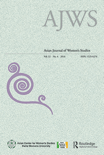
ASIAN JOURNAL OF WOMENS STUDIES
Navigating the Complexities of Gender in Asia.ASIAN JOURNAL OF WOMENS STUDIES, published by Taylor & Francis Ltd, is a distinguished scholarly journal serving the field of Gender Studies since its inception in 1996. With an ISSN of 1225-9276 and an E-ISSN of 2377-004X, this journal is strategically positioned in the United Kingdom, contributing valuable insights and rigorous research to discussions surrounding women's studies in Asia. Currently ranked in the Q2 quartile of Gender Studies by Scopus, the journal holds an impressive rank of 83 out of 213, placing it within the 61st percentile of its category. The ASIAN JOURNAL OF WOMENS STUDIES aims to bridge academic scholarship and real-world gender issues, inviting contributions that encompass a wide range of topics from feminist theory to socio-political analysis. While it does not operate under an Open Access model, it remains committed to enhancing knowledge in gender studies, making it an essential resource for researchers, professionals, and students dedicated to understanding and advocating for gender equality and women's rights across diverse cultural landscapes.
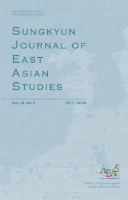
Sungkyun Journal of East Asian Studies
Exploring the Rich Tapestry of East Asian CulturesSungkyun Journal of East Asian Studies, published by the ACAD EAST ASIAN STUD, SUNGKYUNKWAN UNIVERSITY, is a premier open-access journal dedicated to the exploration and analysis of East Asian cultures, histories, and societies. Since its establishment in 2010, this journal has rapidly gained recognition, currently holding a notable impact across various disciplines, including Anthropology, Cultural Studies, Literature, Religious Studies, Sociology, and Political Science. As of 2023, it is classified in quartiles Q4 in Anthropology and Sociology, and Q3 in Cultural Studies and Religious Studies, highlighting its growing influence and relevance in contemporary research. Researchers and scholars can take full advantage of its open-access model introduced in 2021, ensuring broad dissemination of knowledge and fostering an inclusive academic discourse. The journal aims to facilitate interdisciplinary dialogue and critical insights into East Asian issues, making it an invaluable resource for students, professionals, and academics seeking to deepen their understanding of this dynamic region.

South Asian Review
Illuminating the Intersections of Language, Literature, and Culture.South Asian Review is a distinguished academic journal published by Taylor & Francis Ltd, dedicated to exploring the rich tapestry of cultural, linguistic, and literary landscapes of South Asia. Renowned for its interdisciplinary approach, the journal covers a wide range of topics, making significant contributions to the fields of Cultural Studies, Gender Studies, Linguistics and Language, and Literature and Literary Theory. With a commendable Q1 ranking in Literature and Literary Theory and notable placements in other relevant categories as of 2023, it offers researchers, scholars, and students a platform to share critical insights and foster dialogue within these dynamic fields. Although it operates under traditional subscription models rather than open access, South Asian Review remains a vital resource for those seeking to understand and engage with the complexities of South Asian contexts and identities. Its commitment to scholarly excellence is reflected in its impact on contemporary academic conversations, making it an essential read for anyone interested in the nuances of South Asian studies.
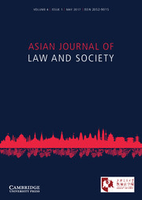
Asian Journal of Law and Society
Fostering Scholarly Discourse in Law and Social SciencesAsian Journal of Law and Society, published by Cambridge University Press, serves as a vital platform for scholarly discourse in the fields of law and social sciences. With an impressive 2023 impact factor placing it in the Q2 quartile in both law and sociology/political science categories, this journal is influential in shaping contemporary legal and sociological thought. Covering a broad range of topics, from legal frameworks in Asian contexts to the interplay between law and societal dynamics, the journal invites researchers, practitioners, and students to contribute original articles, critiques, and interdisciplinary analyses. Although it does not currently offer open access options, the Asian Journal of Law and Society continues to be recognized for its significant contributions, as reflected in its Scopus rankings, where it is positioned in the top 30% of law journals and around the 44% ranking in sociology and political science. This trajectory highlights its importance for anyone interested in understanding the complex legal landscapes and social structures across Asia.

Taiwan Journal of East Asian Studies
Advancing Knowledge in the Heart of East AsiaTaiwan Journal of East Asian Studies, published by National Taiwan Normal University, College of International Studies & Social Sciences, serves as a critical platform for disseminating research focused on the dynamic and multifaceted realms of East Asian cultures, societies, and politics. With its ISSN 1812-6243 and a commitment to scholarly excellence since its inception in 2004, this journal primarily aims to foster interdisciplinary dialogue among researchers, professionals, and students interested in the diverse aspects of East Asian studies. The journal is indexed in Scopus, with rankings in the Q4 quartile for both Arts and Humanities and Cultural Studies, highlighting its emerging presence in these fields. Although currently not adopting an Open Access model, the journal provides a vital resource for academic inquiry, with its extensive scope likely to cover topics ranging from contemporary cultural phenomena to historical analyses. By publishing innovative research and theoretical discussions, the Taiwan Journal of East Asian Studies significantly contributes to understanding and advancing the discourse surrounding this important region.

Fudan Journal of the Humanities and Social Sciences
Empowering researchers to shape the future of social sciences.Welcome to the Fudan Journal of the Humanities and Social Sciences, an esteemed publication dedicated to advancing interdisciplinary research within the realms of arts, humanities, and social sciences. Published by SPRINGER HEIDELBERG in Germany, this journal is at the forefront of scholarly discourse, holding a commendable position in the Q1 category for both arts and humanities and social sciences as of 2023. With a robust Scopus rank that highlights its influence—#89 in Arts and Humanities and #58 in Social Sciences—this journal serves as a vital platform for researchers and professionals aiming to disseminate innovative ideas and findings. The journal's scope encompasses a wide array of topics, reflecting contemporary cultural and social dynamics while encouraging the exploration of nuanced theoretical frameworks. Although the Fudan Journal currently does not offer open access, its published articles are accessible through institutional subscriptions, fostering academic rigor and providing valuable resources for scholarly pursuits.